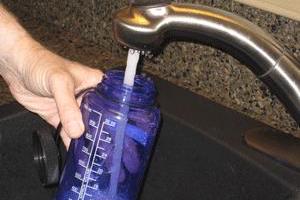Whether you're jogging, playing basketball, going for a walk or working outside, it is important to be smart about staying hydrated when temperatures are on the rise. Water is an essential nutrient, meaning it must be supplied from an outside source because the body cannot make sufficient amounts. If you exercise or work outdoors in hot weather, it is important to stay hydrated. Cool water between 40º and 50º F is best. Don’t wait for thirst to indicate dehydration; drink ahead of your thirst.
Tips to Stay Hydrated:
- Watch for warning signs. During hot weather, watch for signs of heat-related illness, including muscle cramps, nausea or vomiting, weakness, headaches, dizziness, and/or confusion. If these symptoms develop, lower your body temperature and get hydrated. Stop what you’re doing and get out of the heat. Remove extra clothing or sports equipment, drink fluids, and try fanning your body or wetting it down with cool water.
- Water recommendations. The human body is made up of 60-75 percent water and unlike other nutrients there isn’t a specific daily recommendation, due to variability in climate, physical activity level, state of health, and body size. Under typical circumstances, adults should get up to 6 or 8 cups of fluid daily. Infrequent urination or dark yellow urine may indicate you need to drink more fluids.
- Sources of water. Beverages, fluids, and solid foods contain water. Lettuce, celery, and crisp vegetables are 90 percent or more water. Meat, fish, or chicken may have up to one-half or two-thirds their weight in water. Grain products may be up to one-third water. Even though solid food is a source of water, additional water from drinking fluids is still needed. Water, juices, milk, or other beverages can boost fluid intake.
- Special hydration considerations. In hot weather, fluid intake and output should be carefully monitored with infants, young children, and older adults. Children have a lower sweating capacity and tolerate high temperatures less efficiently. In older adults, their thirst mechanism may not be as efficient and medications and disease may affect fluid intake and water balance. Encourage water intake often for both the young and the old.
- Hydration and athletes. Of all nutritional concerns for athletes, the most critical is adequate water intake. The athlete’s immediate need for water is to control body temperature and cool working muscles. To prevent dehydration during exercise, athletes should drink fluids before, during, and after activity. Even exercise in cold weather produces sweat and requires adequate fluid replacement.
The combination of hot, humid temperatures and being physically active outside, whether for work or for play, can put people at risk for dehydration. Remember to keep water handy and make it habit to drink water every day. Sipping throughout the day is better than saving up for scheduled meals or breaks. Check out www.food.unl.edu for more food, nutrition, and health information.
